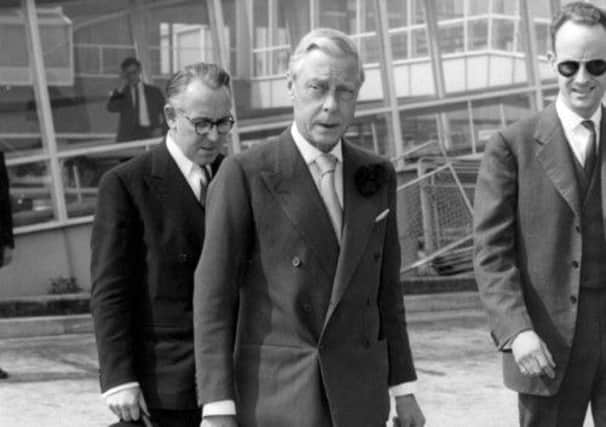Book review: The Windsor Faction


THE WINDSOR FACTION
DJ TAYLOR
Chatto & Windus, 384pp, £14.99
But things in D J Taylor’s novel aren’t just as they were in real life, for it is also an exercise in counter-factual history. He writes about the past not only as in many respects it was, but also as it might have been; and does so ingeniously and persuasively.
His starting-point is that there was no Abdication in 1936. Wallis Simpson died suddenly on an operating table, and so Edward VIII remained King. Edward was believed by many to have pro-German sympathies, even pro-Nazi ones. Taylor doesn’t go quite that far, but his Edward, lonely and unhappy, has at the very least no enthusiasm for the war; he had enough experience of the 1914-18 war to remember its horrors. Taylor treats Edward sympathetically and plausibly.
Advertisement
Hide AdThree other real-life people play prominent parts in the novel (a few others have walk-on ones). They are Captain Ramsay, the Tory MP for Peebles and South Midlothian, pro-German, fanatically anti-Semitic; Tyler Kent, a cipher clerk in the American Embassy, who shared Ramsay’s views; and Beverley Nichols, once one of the Bright Young People and a promising novelist who ended up writing twee pieces about his garden and house furnishings for women’s magazines.
Taylor’s version of the seditious activities of Ramsay and Kent is true to life – one of their fellow conspirators is an invented Tory MP in communication with the German Foreign Minister, von Ribbentrop. One might add that Gavin Bowd in his recently published Fascist Scotland shows Ramsay to have been even nastier and crazier than Taylor makes him appear. Nichols’s role, recounted complacently in the journal Taylor writes for him, is to liaise with the King and persuade him to insert a plea for a negotiated peace in his Christmas broadcast.
Taylor shows the conspiracy of the self-styled “Windsor Faction” to have been absurd. The Germans weren’t interested, and the security services were keeping tabs on them, not always efficiently. Nevertheless, there were real-life machinations resembling those in the novel, and the pro-Nazi American Tyler Kent is a splendid smiling villain.
All this is fine, but the novel is much more than an intriguing exercise in alternative history. Taylor has shown in previous novels that he has a wonderful feeling for the mood and atmosphere of the Thirties, and he catches the feeling of the anxious months of the phoney war perfectly. Deeply versed in nineteenth- century fiction – he has written an outstanding biography of Thackeray and at least a couple of what one might call neo-Victorian, rather than pastiche-Victorian, novels – he writes with a Victorian love for detail and imagery, and the relish of the Victorian masters for a good plot. As it approaches its denouement, one may think he goes a bit over the top. No matter; the scene in which a young girl sent to obtain an incriminating document is held prisoner in a manor house is one that Wilkie Collins would have been proud to have written.
He catches the rhythm of everyday life beautifully, and his range is wide. There are splendid scenes in the office of Duration, a literary magazine whose editor bears more than a passing resemblance to Cyril Connolly, and where a distraught contributor tries to kill himself while others swig Algerian wine at a launch-party; in Soho pubs and restaurants; and in a seedy antique-cum-junk shop which is straight out of Graham Greeneland. The descriptions of London streets and squares have all the true-to-experience of the best sort of black-and-white movie; time and again indeed Taylor gives us a grainy Newsreel in well-chosen words, often indeed exquisitely chosen ones. His depiction of London and London life in the months before the German attack on the Maginot Line and the Blitz that followed the Fall of France is a fine example of historical imagination re-creating the past.
Taylor is a very literary writer, and his novel is full of echoes of the novelists of the time: Greene, obviously, but also Anthony Powell, Elizabeth Bowen, Henry Green, and Orwell. This is delightful for those sufficiently well-read to spot the resemblances, but I doubt if failure to do so will spoil the pleasure that other readers will find in the novel.
Advertisement
Hide AdHe is a bit of a magpie. There is a scene in the Duration office when the secretaries have to alter the first line of a story because the distributors refuse to handle it for fear of being prosecuted for obscenity. The story is obviously Julian Maclaren Ross’s “A Bit of a Smash in Madras” though it is attributed to the author who tries to hang himself in the lavatory. Such incidental pleasures are numerous. Dwelling on them shouldn’t, however, obscure what is likely to be the novel’s main appeal: that it is a rattling good story which faithfully and imaginatively recreates the atmosphere of those strange months when Britain was at war but nothing seemed to be happening.
The book is both witty and humorous – the chapters from Beverley Nichols’s journal are sheer delight, and Taylor manipulates his huge cast of characters adroitly. In short, this is as skilful and enjoyable a novel as you can ask for, the work of a master-craftsman.